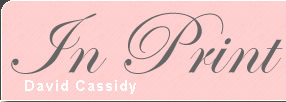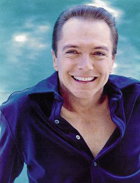
David Cassidy in the News
The new corporate rock
Big paychecks lure top performers to do private shows
March 2, 2001
By Steve Morse
The Boston Globe
They are the gigs that you never hear about except by accident. The Rolling Stones playing for Pepsi executives in a tent in Hawaii. James Brown getting down at a private party for Progress Software. Celine Dion crooning for Gillette. Bob Dylan singing for Applied Materials. And Elton John and Stevie Wonder entertaining guests at Swedish businessman Bertil Hult's recent 60th birthday bash in Boston.
In Colorado, Sheryl Crow, Hazel Miller and Big Head Todd & The Monsters played a birthday party for business-supply magnate Bob King at Wolfgang Puck's last summer. Donna Summer, Michael Bolton and Linda Ronstadt are among the other rock talents booked recently for local corporate affairs.
Private concerts for corporate leaders - once shunned by protest-minded rock stars - are an exploding part of today's soundscape.
"This is a multi-multimillion-dollar business," says Robert Norman of Creative Artists Agency in Los Angeles, who booked Wonder's Boston show.
Ever since the Stones took tour sponsorship from Revlon, Michael Jackson sold the rights to a Beatles' classic to Nike, and Bob Dylan gave "The Times They Are a-Changin'" to an accounting firm, the boundaries between pop musicians and major corporations have never been the same.
Nearly everyone, it seems today, has his or her price.
A few acts still refuse to play corporate events - Pearl Jam, Bruce Springsteen, Tom Petty, Neil Young, and Phish are among them - but their ranks are clearly dwindling. The pay is too high for most entertainers to resist.
The money behind these events, which range from private parties to convention gatherings, is mind-boggling. No one is saying how much John or Wonder received for their Boston show - played before an intimate group of 550 people, including the king and queen of Sweden - but agents nationwide say that superstars like John, Whitney Houston, Tina Turner, Jimmy Buffett and Billy Joel typically get $1 million-plus for a corporate show.
Receiving $750,000 are Santana and Sting. Most other acts charge between $40,000 and $400,000, such as Summer, Huey Lewis & the News and Ray Charles.
This is more than they could make in a regular public concert, plus all expenses are covered, and there are no marketing costs.
"This is a very healthy business, but very private," says Norman. "These concerts are kept strictly confidential, primarily because of security issues."
"The ones who did these shows early (in the '80s) are still doing them - such as Neil Sedaka, Marilyn McCoo and the Temptations - but now you have the Sheryl Crows and James Taylors doing them, as well as younger bands like the Stone Temple Pilots," says Chris Burke, vice president of corporate events for the William Morris Agency in Los Angeles.
Burke began booking corporate shows 15 years ago. Today, business has quadrupled: to whereHe books 1,000 dates a year.
"Some acts shy away because they don't need the money, and some acts just don't want to do them," says Burke. "But the stigma is gone. These shows used to signify the end of your career - sort of like going to play in Las Vegas. But now both of those things are untrue.... many acts on the way up play (corporate events) and everybody plays Las Vegas."
Some private concerts are purely social, such as the Backstreet Boys playing at the bar mitzvah of a friend last year. But most of the concerts are for private corporations.
Elton John has performed for Anheuser-Busch, Steve Miller for Oracle, James Taylor for Hill Holliday, the band Bush for Miller Beer, Blood, Sweat & Tears for Fidelity (at the FleetBoston Pavilion last summer), and Crosby, Stills & Nash for WorldCom.
Rod Stewart, Willie Nelson, Sugar Ray, the Goo Goo Dolls, Los Lobos, Tony Bennett, Harry Belafonte, David Cassidy and Kenny Loggins have also plugged in on the corporate tab.
Yet while many artists play these events, not all seek them out. Fast-rising country star Lee Ann Womack says, "They're not always an artist's favorite kind of show. The pay is good, but it's not like you're playing for your real fans."
"You have to offer artists outrageous money to do them, because it's not an ideal performance setting," says Gary Bongiovanni, editor of the trade magazine Pollstar. "But these shows are getting better because most of the major promoters have gotten into them and brought in professional staging. So the artist doesn't have to worry about anything going wrong."
In Boston, the Don Law Company, now owned by SFX, has hired two staffers to focus exclusively on corporate shows. Denise Kirk and Kathy Lobdell, book nearly 150 shows per year. They're also starting to branch out internationally and soon hope to book acts for companies in London and South Africa.
"The intertwining of corporate interests and rock 'n' roll is continuing," says John Paluska, who manages Phish, one of the few bands that won't do corporate dates. "We've been asked to do them, but it's not the band's thing. It's just too weird for the band. For example, I got my wife into the Rolling Stones' private show for Pepsi in Hawaii a couple of years ago, but she was mortified by the whole thing. There were a lot of Pepsi executives talking over the music."
Some agents, though, say that corporate shows can get even wilder than a band's regular gigs. Says Burke of the William Morris Agency: "One of our acts, Kenny Loggins, just did a show where everyone was dancing on tables, including the president of the company."
The acts playing these shows still tend to be "squeaky-clean" as befitting corporate tastes, says Burke. The so-called "unpredictable" rock bands such as the Red Hot Chili Peppers (whose members are known for taking off their clothes) don't get any requests. Nor do most rap acts. "I've never had a request for a hip-hop act," says Lobdell of Don Law's office.
Classic-rock bands tend to be the corporate favorite - and there's even an ad hoc group, the World Classic Rockers, that only plays corporate gigs, about 50 per year. The group is comprised of past members of popular bands - Randy Meisner of the Eagles, Spencer Davis of the Spencer Davis Group, Denny Laine of Wings, and Nick Nicholas and Michael Monarch of Steppenwolf.
"I can't fault anyone for doing these shows," says Tim Collins, former manager of Aerosmith. "But it's definitely an indication of the shift in what rock music stands for. Years ago, rock was a movement and a spirit where you wouldn't think of doing this. In the early days of the Beatles and the Who, the whole idea was that you couldn't buy those acts. Now it's all about the money and the feeling that anyone can be bought."
